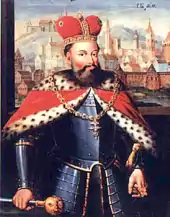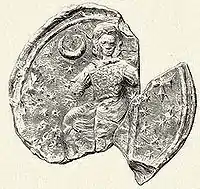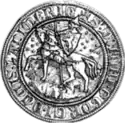List of princes of Galicia and Volhynia
This is a list of princes of Galicia (Halych or Halychyna) and its sister principality Volhynia (or Volodymyr). They were basically separate principalities (rulers being closely related) until Roman the Great, Prince of Volhynia who conquered also Halych but immediately gave it to his son. They continued usually as separate states, but within the same dynasty and under vassalage to Knyaz of Halych until Lev, who annexed Volhynia to the principality. The royal crown lapsed and rulers were known as princes and/or dukes after Andriy Yuriyovych.
Roman Mstislavich united Halych and Volhynia in 1199.[1]
Volhynia
Princes of independent Volhynia
- Boris Vladimirovich
- Vsevolod I 987–? - brother of Boris
- Sviatoslav I 1036–1054 - also ruler of Kievan Rus'
- Igor Yaroslavich, 1054–1056
- Rostislav I 1056–1064 - also ruler of Tmutarakan.
- Oleg I 1075–1076 - also ruler of Chernigov.
- Yaropolk I Iziaslavich 1078–1087
- David Igorevich 1087–1099
- Mstislav I Sviatopolkovich 1099
- Yaroslav 1100–1118 - brother of Mstislav I.
- Roman I Vladimirovich 1118–1119
- Andrew I 1119–1135 - brother of Roman I.
- Iziaslav I Mstislavich 1135–1141
- Sviatoslav II 1141–1146 - also ruler of Kiev.
- Vladimir I Andriyovich 1146–1149
- Sviatopolk Mstislavich 1149
- Iziaslav II 1149–1151 - brother of Sviatopolk.
- Sviatopolk Mstislavich (again) 1151–1154
- Vladimir II Mstislavich 1154–1157
- Mstislav II 1157–1170 - also ruler of Kiev.
- Sviatoslav III Mstislavich 1170–1173
- Roman II the Great 1173–1188
- Vsevolod II Mstislavich 1188
- Roman II the Great (again) 1188–1199 - also ruler of Kiev
Volhynia in the Kingdom of Halych-Volhynia
- Between 1199 and 1205: annexed by the Kingdom of Halych–Volhynia
- Sviatoslav IV Igorevych 1206–1207
- Alexander Vsevolodovich 1208, 1209–1215
- Between 1215 and 1238: annexed by the Kingdom of Galicia-Volhynia
- Vasylko Romanovych 1238–1269
- Volodymyr Vasylkovych 1269–1288
- Mstyslav Danylovych 1288–1292
- In 1293, Lev I centered all the power of the kingdom in his own hands, and the principality ceased to exist.
Halych
Princes of independent Halych
- Volodar Rostyslavych of Tmutarakan ?–1084
- Vasilko Romanovich 1084–?
- Yuriy Vasilkovich ?
- Igor-Ivan Rostislavich ?–1141
- Vladimir I Volodarovich 1141–1153
- Yaroslav Osmomysl 1153–1187
- Oleg Yaroslavich 1187
- Vladimir II Yaroslavych 1187–1189
- Oleg Yaroslavich (restored) 1188
- Roman the Great 1188
- Andrew I 1188–1190
- Vladimir II Yaroslavych (restored) 1190–1199
Halych in the Kingdom of Halych–Volhynia
Between 1199 and 1206: annexed by the Kingdom of Halych–Volhynia
- Vladimir III Igorevich 1206–1208
- Roman II Igorevich 1208–1210
- Vladimir III Igorevich (again) 1211
Between 1211 and 1213: annexed by the Kingdom of Halych–Volhynia
- Vladislav 1213
- Coloman of Halych–Volhynia and Salomea of Poland 1213-1219
- Andrew II 1220–1221
- Mstislav the Bold 1219–1228
Between 1228 and 1264: annexed by the Kingdom of Halych–Volhynia
- Svarn 1264–1269
- In 1293, Lev I centered all the power of the kingdom in his own hands, and the principality ceased to exist.
Halychyna and Volynia (Halych–Volhynia)
Romanovichi
| Portrait | Name | Born-Died | Ruled From | Ruled Until |
|---|---|---|---|---|
 | Roman the Great, son of Mstislav II of Kiev. Roman united Halych and Volhynia in 1199.[1] | 1160–1205[2] | 1199 | 1205[2] |
 | Daniel, under regency during his minority. Batu Khan confirmed Daniil as prince of Halych and Volynia in 1245.[3] Crowned in 1253. | 1201–1264 | 1205 (disputed)[2] 1245 (confirmed)[3] |
1264 |
 | Leo I | 1228–1301 | 1264 | 1301 |
 | Yuri I | 1252–1308 | 1301 | 1308 |
 | Andrew, brother of Lev II, ruled jointly with him. | ?-1323 | 1308 | 1323 |
 | Leo II, brother of Andrew, ruled jointly with him. | ?-1323 | 1308 | 1323 |
Piast Dynasty
| Portrait | Name | Born-Died | Ruled From | Ruled Until |
|---|---|---|---|---|
 | Boleslaw-Yuri II, grandson of Yuri I by his mother Maria. | 1298/1308–1340 | 1325 | 1340 |
 | Casimir, brother-in-law of Boleslaw-Yuri II. Also king of Poland 1333–1370. Died without male heirs and all his possessions passed to Louis of Anjou, his nephew. | 1310–1370 | 1340 | 1370 |
House of Anjou
| Portrait | Name | Born-Died | Ruled From | Ruled Until |
|---|---|---|---|---|
 | Louis I the Great, nephew of Casimir. As King of Hungary, received all possessions of his uncle, becoming also King of Poland. | 1326-1382 | 1370 | 1382 |
 | Maria, eldest daughter of Louis I. Also Queen of Hungary. | 1371-1395 | 1382 | 1387 |
 | Hedwig, sister of Maria. Also Queen of Poland. | 1373-1399 | 1387 | 1399 |
In 1399, Galicia-Volhynia merged in the Kingdom of Poland.
References
- Martin 2007, p. xvi.
- Martin 2007, p. 141.
- Martin 2007, p. xviii.
Bibliography
- Martin, Janet (2007). Medieval Russia: 980–1584. Second Edition. E-book. Cambridge: Cambridge University Press. ISBN 978-0-511-36800-4.
External links
- Historical notes about political history of principality of Galicia - Volhynia
- mykolaiv.lviv.ua - Королівство Русі: реальність і міфи (in Ukrainian)